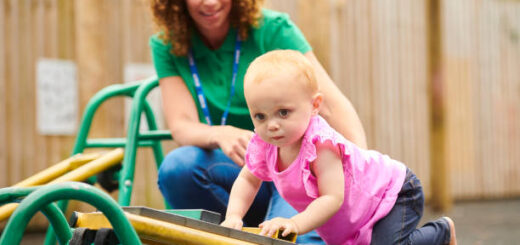How do parents pick the right preschool? Use head, heart and gut, say experts
- When choosing the best preschool for your child, higher costs do not mean more secure or high-quality programs experts from early childhood.
- In addition to financial and logistical considerations, parents must also consider the center’s values, teaching methodologies, and whether they align with the child’s preferred learning style.
- Parents are encouraged to visit preschools in person to observe the teachers’ interactions and interactions with their students since they may provide clues as to the school’s culture.
- Experts recommend that parents take the lead in their child’s development and learning and view schools as acting “a supportive role.”
Preschool safety measures have been in Singaporeans ‘ minds for the past few days following the news that Kinderland, a private school that charges parents as much as S$1,700 to run its programs, made headlines for several instances of child mismanagement.
Early childhood experts informed TODAY that a more significant cost does not necessarily mean a higher quality or a safer program.
Instead, when making their decisions, parents must be guided by an exercise that involves their “head, heart and gut,” as stated by Ms Melissa Goh-Karssen. She is an Early Childhood Education program instructor at the Singapore University of Social Sciences. Singapore University of Social Sciences.
‘HEAD’: LOCATION, COST AND LICENCE TENURE
Parents today spoke to those who said they picked a preschool close to their homes and whose costs fit under their spending budgets.
While it may seem ordinary, Ms. Goh-Karssen has more than 20 years of experience in the field and has suggested that these cost aspects should be considered in the long term.
For example, several private operators could cost up to S$3000 per month for their programs that range from preschool to infant care.
Although parents might be able to pay the cost of one child’s education, they must think about whether it’s still cost-effective if they can have more children in the future. Ms Goh-Karssen stated.
According to Ms. Seri Rahayu, the manager of learning and development help for the E-Bridge Preschool, costly fees aren’t an assurance of quality.
Ms. Seri and Ms. Goh-Karssen are fellows of the Early Childhood Development Authority (ECDA), where they assist in creating resources and improving the quality of services in the field.
In addition to financial and logistical issues In addition to economic and logistical considerations, Ms. Seri stated that it would be helpful to determine the condition of a preschool’s license duration, which is issued through the ECDA.
According to the Early Childhood Development Centres Act, Preschools must meet the standards set by law and education in areas such as administration safety and hygiene program curriculum, physical environment, and the quality of personnel.
The ECDA’s decision to award the license tenure, which could range between six and 36 months, confirms the center’s performance and compliance with these requirements.
The longer tenure granted, the higher performing ECDA considers that school regarding its early child development services.
“If a centre has been around for many years and meets the basic requirements… it should not get less than a year,” she said. Seri.
The teacher advised parents to immediately inquire about the center in case a tenure of 6 months was granted.
Ms Seri also advised parents to check the possibility of a center accredited by the Singapore Preschool Accreditation Framework (Spark). Singapore Preschool Accreditation Framework (Spark) measures the quality of the school.
As per Spark’s site,913 decenters are certified by Spark w, with another 129 receiving an award for their outstanding processes in teaching and learning in addition to the curriculum, leadership, and pedagogy.
‘HEART’: CONSIDER CENTRE’S VALUES AND TEACHING APPROACHES
Parents must note the school’s overall values regarding curriculum, teaching, and learning methods elements that should be evaluated using”the “heart,” “aid Ms. G.oh-Karssen?
Parents must consider whether these aspects align with their beliefs about education and what they may like to see their children learn from them.
“You want to look at the tangible practices and actions of the centre, because whatever the centre does — whatever you see in their day-to-day practices — is going to be there in the long run because this is the philosophy of the school,” she stated.
“Otherwise, what you’re going to end up with in the long run is a lot of complaints… because fundamentally, it just wasn’t a centre for you to begin with.”
Mrs. Marian Lee, the center director of the Ministry of Education (MOE) kindergarten in West Spring Primary School, and Mrs . Marian Lee, the letterhead of a West Spring Primary School kindergarten.
“I’ve always told parents that when you’re selecting a school, you must find one that you can identify with in terms of your priorities for the children,” she explained.
It could mean choosing an institution with a more robust academic emphasis or a holistic approach to developing interpersonal skills. Added.
Mrs. Lee was part of the team that established MOE Kindergartens in 2014. explained she’s observed in recent years a growing number of kindergarten children struggling with inhibitory control because of the COVID-19 virus.
Inhibitory control refers to a set of mental skills, which include self-control. Children who lack inhibitory control might experience temper tantrums, anger management issues, and an inability to concentrate.
“We are seeing a lot more of these challenges in children because overexposure to screen time at too young an age does impair some aspects of brain development,” Mrs Lee explained.
She said that if children with these issues begin elementary school, “the transition will be a lot tougher,
When preparing for the transition and deciding on the right school, Ms. Goh-Karssen suggested parents must perform an honest evaluation of the abilities that their children are lacking.
“If I suspect that my child has issues with emotional issues, should your primary focus be social-emotional or advancing the child’s reading skills? I would recommend social-emotional as you’d like to ensure that your child has an established foundation,” she said.
Parents must consider their child’s learning style and preferences when picking the best school for their child.
“If your child is not a child who takes to that teaching approach, for example, even as a parent, you can put your child in that setting, but it may not do your child justice,” Ms. Goh-Karssen said.
“That means your child might end up feeling less off than more off.”
‘GUT’: VISITING CENTRES IN PERSON, TRUSTING INSTINCT
IParents must visit schools they’ve shortlisted in person and be confident in their judgment, according to Ms. Goh-Karssen.
Parents are advised to make these visits when actual classes are in session, said Ms. Seri, because children’s behavior can reveal clues to the relationship between teachers and students.
A child’s moody attitude as they enter the school Children who remain quiet or refuse to talk with their teacher or classmates can serve as “indicators” or a reflection of the school’s environment.
“Children’s expressions cannot lie… If it’s good and energetic, then it’s a sign the activities are developmentally appropriate for the children,” Ms Seri stated.
According to Ms. Goh-Karssen, parents must look beyond their academic credentials or years of professional experience. Noting that it’s “unrealistic” to expect to have experienced teachers in one center due to the scarcity of early elementary educators.
What one’s feelings about the teachers in the center, as well as its director, “is always of utmost importance,” she said.
“You want to think not just about the competencies of the teachers, but also how they work together,” she explained.
“Inevitably it will impact and impact the development and learning for the children. Since the adults within the child’s life are directly impacted by the children’s world.”
No matter which school parents decide to attend, Ms. Goh-Karssen believes parents should be aware that schools play a “supportive role” in a child’s education and development and that the ultimate responsibility is with the family.
“Organisations can change management at any time. Preschools are updated and reviewed their approach to curriculum and standards regularly and also. Teachers and leaders of the centre come and leave,” she said.
“We cannot take that mindset where we believe that the school takes on the primary role of developing and teaching our children, because if we have that mindset, when things change in a school, it’s going to drastically affect the children.”
Ms Go.h Karssen said this mental shift would increase a child’s capacity to conquer obstacles “regardless of what changes might happen.”
.” think it will be a whole lot more positive… because the home foundation has played a good factor in that stability for the child.”



